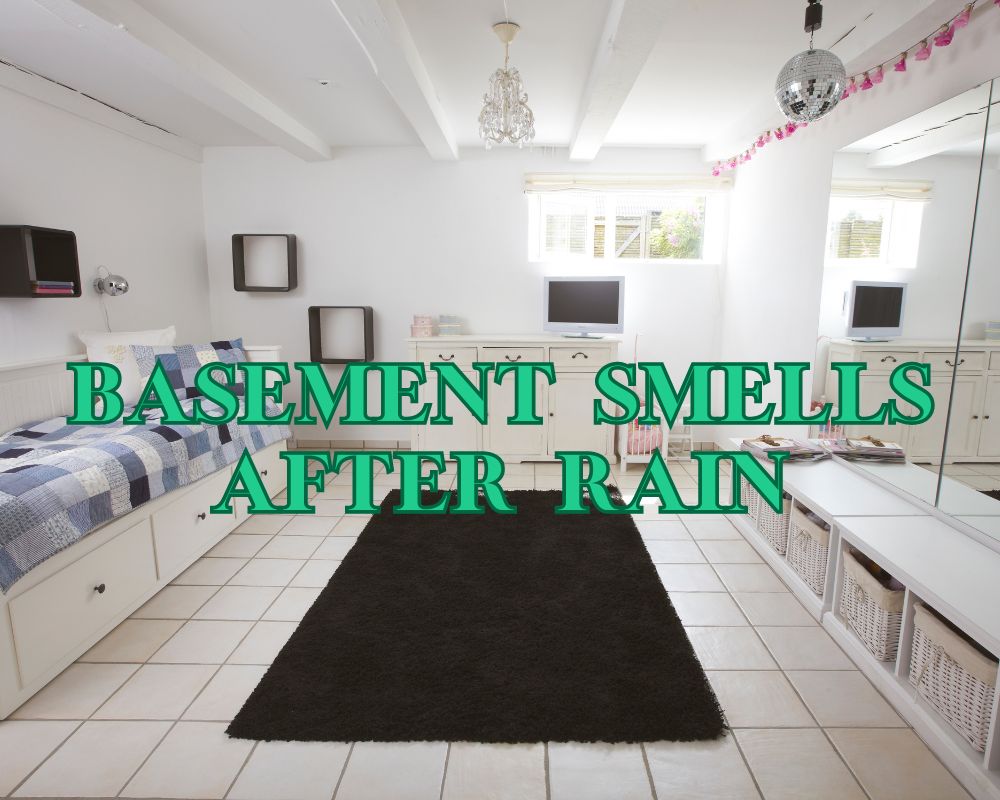Why Your Basement Smells After Rain: Solutions & Tips

Basement smell after rain. You’re not alone if you’ve noticed an unpleasant odor in your basement after rainfall. This is a common problem that many homeowners face, but there are effective solutions and tips to prevent basement odor and maintain a moisture-free environment. In this section, we will explore why your basement smells after rain. We will also provide practical solutions and tips to help you prevent basement odor and keep your basement dry.
One of the main causes of a damp basement odor is moisture. When rainwater seeps into the ground, it can penetrate your basement walls and floors, causing them to become damp. Mold and mildew often thrive in moist environments, creating a musty smell in your basement. Additionally, water damage can contribute to the unpleasant smell. Water infiltration can occur through cracks or gaps in your foundation, resulting in the growth of mold and mildew and the presence of unpleasant odors.
Fortunately, there are several solutions to combat basement odor and prevent moisture from infiltrating your basement. One effective method is waterproofing your basement. Sealing any cracks and gaps in your foundation is an effective way to stop water from seeping in, which can lead to dampness and the growth of mold. Additionally, dehumidifiers are a practical solution for maintaining a dry basement free from unpleasant odors. These devices can reduce moisture levels and eliminate musty smells in your basement.
Table of Contents
Understanding the Causes of a Damp Basement Odor

It’s common to experience a damp basement odor, especially after rainfall. Understanding the causes of this unpleasant smell is crucial in finding the right solutions to eliminate it and prevent it from recurring.
Moisture is responsible for the prevalent musty smell in basements post-rainfall. Whether it enters through leaks or arises from elevated humidity levels, water creates an optimal breeding habitat for mold and mildew to thrive in your basement. These fungi thrive in damp environments, and their growth can result in an unpleasant odor.
Other potential causes of a damp basement odor include poor ventilation, inadequate insulation, and lack of sunlight. These factors contribute to elevated humidity levels and can result in musty smells.
In some cases, the cause of the damp smell may be more severe, such as sewer gas leakage or a dead animal in your basement. If you suspect these sources, it’s important to seek the help of a professional.
To effectively eliminate a damp basement odor, it’s important to identify and address the root cause. This may involve addressing water damage, improving ventilation, or implementing a basement waterproofing solution.
Next, we’ll explore some effective techniques to address water damage in your basement.
Addressing Water Damage in Your Basement
If your basement smells after rain, it might be due to water damage. Water infiltration can occur through cracks in the walls or floor, poorly sealed windows and doors, or a damaged foundation. Water entering the basement can lead to mold growth and accumulation of moisture, resulting in a musty smell that can linger long after the rain stops.
Preventing water damage is crucial in eliminating basement odor. Start by inspecting your basement for any signs of leaks or water damage. Look for water stains on the walls or ceilings, damp carpets, and musty odors. If you notice any of these signs, you may need to hire a professional to address the problem.
Once you have identified the source of the water damage, take measures to repair it. This might include sealing cracks in the walls or foundation, repairing or replacing damaged pipes, or installing proper drainage systems.
Preventing basement odor due to water damage also requires maintaining a dry environment. Use a dehumidifier to reduce moisture levels in the air and properly ventilate the basement to circulate the air.
Regular maintenance is also essential in preventing water damage and musty basement odors. Make sure to clean out gutters and downspouts regularly to avoid water overflow. Keep your landscaping graded away from the foundation to prevent water from pooling around the basement walls.
By taking these preventive measures, you can eliminate water damage and prevent basement odor from occurring in the future.
The Role of Basement Waterproofing
One of the most effective ways to prevent basement odor is through waterproofing. By keeping your basement dry, you can prevent the growth of mold and mildew, which are the primary causes of musty odors. Additionally, waterproofing can prevent water damage from leaks or floods, leading to unpleasant smells and even structural damage.
Basement waterproofing can be achieved through various approaches, such as interior and exterior methods. Interior waterproofing entails installing a drainage system and sump pump to eliminate surplus water, whereas exterior waterproofing involves sealing the foundation walls using a waterproof membrane or coating. Both techniques effectively safeguard against moisture and water infiltration.
Hiring a professional contractor to assess your basement and recommend the appropriate waterproofing solution is essential. A professional can also ensure the process is done correctly, preventing potential issues and providing long-term protection against basement odors and water damage.
Investing in basement waterproofing is a proactive step towards preventing future basement odor problems and maintaining a safe and healthy environment in your home. By implementing waterproofing measures, you can keep your basement dry and odor-free, ensuring a pleasant living space for you and your family.
Dehumidifiers and Basement Odor Control
To prevent basement odor, a dehumidifier should be your go-to solution. A basement dehumidifier is an effective tool that can help reduce moisture levels by extracting excess moisture from the air. Doing so can effectively eliminate musty smells often caused by damp conditions.
A dehumidifier works by drawing in moist air and using refrigeration coils to cool it down. This process efficiently removes excess moisture from the air, releasing dry air into the basement. When shopping for a dehumidifier, look for models with high moisture removal rates and automatic shutoff features to ensure maximum efficiency and safety.
A basement dehumidifier can be especially effective if your basement is prone to moisture, whether due to heavy rainfall or poor ventilation. Reducing moisture levels can help prevent mold and mildew growth, common causes of basement odor.
However, it’s essential to maintain your dehumidifier regularly to ensure optimal performance. Clean the filter and coils regularly, and often empty the water collection tray to prevent overflow. A well-maintained dehumidifier can help keep your basement dry and fresh-smelling for years.
Effective Solutions to Get Rid of Basement Odor

If you’re dealing with an unpleasant basement odor, don’t fret! There are effective solutions to get rid of it and prevent it from returning. Here are some tips.
1. Proper Ventilation
One of the simplest ways to eliminate basement odor is by ensuring proper ventilation. Open the windows to allow fresh air to circulate, or install an exhaust fan to vent out stale air. This will help reduce moisture levels, eliminate musty smells, and improve air quality in your basement.
2. Deep Cleaning
Deep cleaning is another effective solution to get rid of basement odor. Dust and wipe down all surfaces with a damp cloth, paying close attention to corners, crevices, and hidden areas where mold and mildew can grow. Use a steam cleaner or a vinegar solution to clean carpets and upholstery to eliminate lingering odors.
3. Natural Odor Absorbers
Natural odor absorbers are a safe and effective way to eliminate basement odor. Place bowls of baking soda, activated charcoal, or coffee grounds around the basement to absorb moisture and neutralize smells. You can also use essential oils or air-purifying plants to freshen the air.
4. Fix Water Leaks
Water leaks are a common cause of basement odor. If you notice any signs of water damage, such as damp spots, water stains, or mold growth, fix them immediately. Repair any leaks in your plumbing, gutters, or roof to prevent water infiltration and keep your basement dry.
5. Use a Dehumidifier
Using a dehumidifier is a great solution to get rid of basement odor. It helps reduce moisture levels in the air and prevents mold and mildew growth, common causes of musty smells. Place a dehumidifier in your basement and set the humidity level to around 50% for optimal results.
By implementing these effective solutions, you can eliminate basement odor and prevent it from returning. Keep your basement dry, clean, and well-ventilated, and use natural odor absorbers or a dehumidifier to control moisture levels. With these tips, you can enjoy a fresh and odor-free basement!
Preventing Future Basement Odor Issues
To ensure that your basement remains fresh and odor-free, it’s essential to take preventive measures. By adopting the following strategies, you can avoid future basement odor issues:
- Maintain your foundation: Regular maintenance can prevent moisture from seeping into your basement. Check for cracks in your foundation walls and have them repaired immediately. Also, ensure that downspouts and gutters function correctly to prevent rainwater from accumulating around your foundation walls.
- Improve drainage: Poor drainage can lead to water penetration and the growth of mold and mildew. Improve drainage around your home by sloping the soil away from your foundation walls or installing a French drain.
- Landscaping: Effective landscaping techniques can effectively mitigate the issue of water pooling around your foundation. By maintaining an appropriate distance between your house and any trees or shrubs, you can prevent roots from infiltrating into the foundation walls.
- Invest in a sump pump: Maintaining a well-maintained sump pump with a reliable backup power supply is crucial for effectively eliminating water from your basement and preventing unwanted moisture buildup.
By taking these preventive measures, you can prevent basement odor and ensure your basement remains dry. Prevention is always better than cure, so be proactive in maintaining your basement to avoid future issues.
The Importance of Professional Assistance

While many effective solutions exist to prevent and eliminate basement odor, some persistent problems may require professional assistance. Experts can assess the underlying issues causing the unpleasant smell and provide long-term solutions.
Professional waterproofing and moisture control services can help prevent water damage and reduce humidity levels in your basement. This, in turn, can eliminate musty odors and prevent future problems.
Additionally, professionals can provide tailored advice and solutions based on the specific needs of your basement. They can also identify potential health and safety hazards, such as mold growth, and take the appropriate measures to address them.
Investing in professional assistance can save you time, money, and frustration in the long run. Addressing basement odor can ensure a healthy and comfortable living environment for you and your family.
Remember, prevention is key. Regular maintenance and proper moisture control techniques can minimize the risk of developing basement odor problems. You can maintain a fresh, odor-free basement by staying proactive and seeking professional assistance.
Conclusion
Basement odor can be a persistent and unpleasant problem, but it is not insurmountable. Implementing the solutions and tips outlined can prevent basement odor and maintain a moisture-free environment. Remember to regularly inspect your basement for signs of water damage and take immediate action if you detect any issues. Dehumidifiers and natural odor absorbers can help keep your basement fresh and dry.


